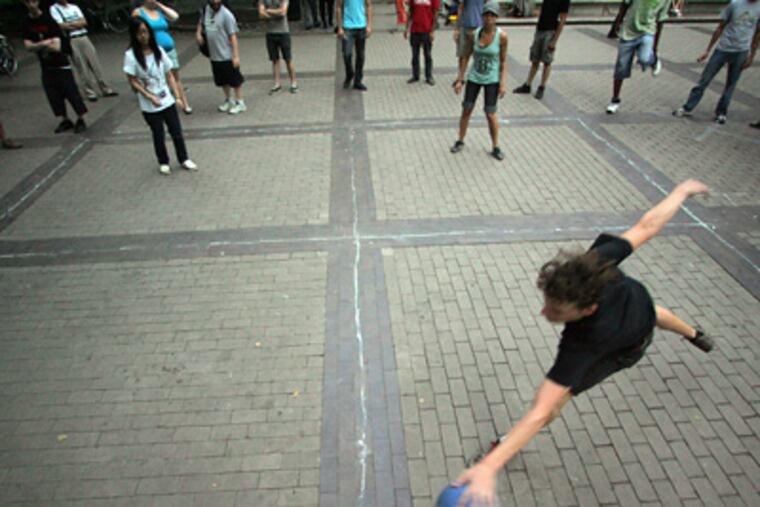City rule forces ball game to bounce around
The summer sunset showdowns started in Rittenhouse Square three years ago. Every Monday night there was a new battle that pitted middle-age businessmen, tweens, artists, and anyone passing through against one another to be the four-square king.

The summer sunset showdowns started in Rittenhouse Square three years ago. Every Monday night there was a new battle that pitted middle-age businessmen, tweens, artists, and anyone passing through against one another to be the four-square king.
But city park rules that ban ball playing - from tossing a football to bouncing the rubber playground ball used in four square - have forced the Monday-night ritual to bounce around Philadelphia. Rittenhouse Square. A dimly lit parking lot under a bridge at 24th and Chestnut Streets. Tonight, word is, the game will go to the Piazza at Schmidts in Northern Liberties.
"It's a shame to shut down something that has brought people together who otherwise wouldn't know each other in a positive way," said Nicole Krecicki, 26, who has played the game since 2006.
"We've had middle-aged guys in business suits and ties set their briefcases down and hop in and play."
"I made a lot of really cool friends here. Young or old, everyone has such a great time," James Klebacha, 25, said on a recent Monday night after police ended the game in Rittenhouse Square.
Four square is a competitive blacktop game most commonly played on school grounds. The goal is to make it to the king square, the most coveted of the four chalked squares. Players eliminate one another by bouncing a ball into someone else's square. The ball cannot bounce twice in one square or go out of bounds. As players are eliminated, those remaining rotate closer to the king square and new players file in.
During a Rittenhouse Square game in early July, a city police officer stopped the group by enforcing the no-ball-playing rule, saying, "I already talked to the people who don't want it and live in the million-dollar houses around here."
Police Sgt. Jim Pauley arrived soon after and suggested alternative parks for the 30 players.
"Stopping something so cool and innocent seemed unnecessary," said Rick Rappaport, 52, a psychologist who had taken a break from tossing a football with his 11-year-old son, Elias, to watch the game. "That square is such a central part of the city. It should be for everybody."
Mark Focht, executive director of Fairmount Park, said his staff had authority to create the regulations governing Rittenhouse Square and other city parks. He said he did not know why or when the no-ball-playing rule was established.
Focht said his staff had received no complaints about the Monday-night games in Rittenhouse Square.
"This is really a minor issue here," he said.
He has seen people waiting in the four-square line as he passed through Rittenhouse Square on the way to dinner with a friend one Monday.
"I didn't even break my stride," he said. "I thought, 'Oh, that looks cool.' "
Focht said residents around Rittenhouse Square "do not make or enforce the rules of the park."
"I think for the people who are playing ball in the park, who may also live in the multimillion-dollar homes . . . if they're not getting in anybody's way, they have a right to use the square," said State Rep. Babette Josephs, a Democrat, who represents the Rittenhouse Square area.
The four-square group now uses Facebook, text messages, and chalk notes in Rittenhouse Square to spread the word of where game will be played.
"I'm hoping that if we lay low for a few weeks, the cops will stop stalking the park [Rittenhouse] on Monday nights and we can continue playing in the park," Krecicki said of the plan to play at 24th Street for a few weeks. The group was evicted from that site last Monday for trespassing.
The goal is to return home to Rittenhouse Square.
"The group builds because of people who are just randomly walking by and wondering what's going on and decide to join in," Krecicki said of Rittenhouse Square. "That's how most of us found out about it to begin with."
Kareem Johnson, an assistant professor of psychology at Temple University, said games like four square encourage people to break down social barriers and "learn that you can be liked and accepted by people who are outside your normal circle."
Johnson said forming good relationships through activities such as four square makes people happier.
Playing the game in a heavily visited site such as Rittenhouse Square promotes interaction, whether it's watching the game from a bench or participating.
"You can only go to Old City so many times before you get sick of it," Justin Clarke, 28, said as he played in a Rittenhouse Square game earlier this month. "There's no egos here, just people trying to have fun with a little kid's game, basically."